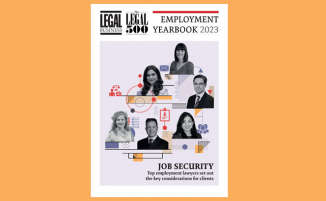Access your pdf edition of the Employment Yearbook 2023
Please see below for a link to an online pdf of the Employment Yearbook 2023. Continue reading “Access your pdf edition of the Employment Yearbook 2023”
Redundancies, restrictive covenants and unions – why employment work is surging in the UK right now
A dynamic and highly active space, employment law is on the cusp of a changing world. The economic climate, new technology, government policy and recent case law precedents have ensured that employment is one of the busier practice areas in 2023. Across litigation and non-contentious work, change is in motion, and the spotlight on this area will continue to grow as the 2020s progress.
Under the lens: the rise of senior investigations
Driven by the coalescing forces of greater employee willingness to raise grievances, heightened interest from regulators and the desire of employers and shareholders to maintain company reputations and safe working environments, conduct investigations into senior employees are more common than ever before. Against this backdrop, it is crucial that in-house legal teams are aware of both when and how to run an investigation process, as well as the likely ramifications.
Continue reading “Under the lens: the rise of senior investigations”
Perspectives: Clare Murray, CM Murray
When you began your legal career, why did you choose employment law?
The 1990s felt like the Golden Age of employment law – employment protections were expanding rapidly (thanks to Europe), opportunities for pushing the boundaries and progressing in employment law seemed limitless; even the Prime Minister and his wife were employment lawyers. All of life was in employment law – power imbalances, relationship struggles, societal prejudices and biases, human ambition, vulnerability and frailties, and so much more. It was the most exciting area of law to go into at that time (and probably still is now), and everyone wanted to be an employment lawyer. I was lucky enough to have great mentors and sponsors who supported my progress and gave me international work that I loved, fantastic opportunities to learn, and, in time, the potential to travel. Employment law opened doors for me that I never expected and which, to this day, I genuinely appreciate. Continue reading “Perspectives: Clare Murray, CM Murray”
Sponsored thought leadership: Mental health in the workplace
Mental health in Singapore’s workplace is a growing concern, with a Straits Times article reporting that nearly seven in ten Singapore residents found 2021 to be the most stressful year at work, and more than half struggled more with their mental health at work in 2021 than 2020.1 This article sets out the existing legal regime regarding mental health concerns at the workplace, and subsequently provides recommendations for employers to consider adopting, particularly if termination is being contemplated.
A. Existing legal regime
Workplace Safety and Health Act 2006 (WSH Act)
Under the WSH Act, employers have a duty to take, so far as is reasonably practicable, measures that are necessary to ensure the safety and health of the employees at work,2 with ‘health’ encompassing both physical and mental well-being.3 Officers of the company are also responsible for ensuring their employees’ safety and health, and would have to show that they had exercised due diligence to prevent workplace incidents.4
Pursuant to the WSH Act, the Workplace Safety and Health Council has approved Codes of Practice (COPs)5 including:
- the ‘Code of Practice on WSH Risk Management’ which was expanded in 2021 to explicitly cover mental well-being and includes examples on how employers can identify, evaluate and manage risks related to mental health at the workplace; and
- the ‘Code of Practice on Chief Executives’ and Board of Directors’ Workplace Safety and Health Duties’, which was launched in 2022 and refers to company directors allocating sufficient resources to promoting workplace mental well-being.
Tripartite advisory on mental well-being at workplaces (Advisory)
The Advisory, which was issued in 2020, recommends that employers provide support for their employees’ mental well-being on three levels:
- Individual: to raise employees’ awareness on mental well-being, provide access to third-party counselling services, and for companies with flexible employee benefits to expand the scope of coverage to include mental well-being programmes, consultations and treatments.
- Team/department: to train supervisors to spot signs of mental distress, foster a psychologically safe and trusting work environment, and strengthen the workplace social support system.
- Organisation: to review the state of employees’ mental well-being regularly as part of the risk assessment for workplace health, review human resources polices, implement and encourage flexible work arrangements and establish work-life harmony and return-to-work policies.6
Upcoming workplace fairness legislation
More recently, on 4 August 2023, the Singapore Government has accepted the final set of recommendations by the Tripartite Committee on Workplace Fairness for the Workplace Fairness Legislation (WFL), which is expected to be passed in 2024. The WFL will inter alia prohibit workplace discrimination in respect of protected characteristics, including mental health conditions which is presently not a protected characteristic under the Tripartite Guidelines on Fair Employment Practices and Wrongful Dismissal.
The definition of ‘mental health conditions’ was recommended to cover more serious forms of diagnosed mental disorders usually associated with distress or impairment in important areas of functioning.7 Details are expected to be made available when the WFL is introduced.
B. Recommendations to address mental health concerns at the workplace
Where there are mental health concerns arising in the workplace, employers should consider inter alia the existing COPs and Advisory, as well as guidance published by the Tripartite Alliance for Fair and Progressive Employment Practices (TAFEP) on supporting employees’ mental well-being at work.
Briefly, TAFEP’s recommendations are that an employer should respond to an employee’s mental health condition by:
- acknowledging the effort and courage taken by the employee to share their mental health condition and to reassure them that their health information will be kept confidential and only disclosed if necessary, and if so, with their consent;
- listening to the employee and exploring accommodations including allowing flexible hours, time off for medical appointments, and having quiet rooms to provide a ‘safe space’ during breaks; and
- organising regular sessions to check in on the employees and direct them to available support services.
If the termination of the employee is being considered, in the case of poor performance, it would be prudent to ensure that there is documented proof recording any performance improvement plan and any reasonable accommodations that had been extended to the employee to accommodate any mental health issues.
In the case of misconduct, extra care must be taken during the inquiry process. Whilst there are no local authorities on the impact of an employee’s mental health issues on an employer’s inquiry into misconduct, there have been foreign authorities, specifically in the UK and Australia, where the following principles may be gleaned:
- insofar as the mental health issue has no relation to the misconduct, there would be no discrimination;
- where the mental health issue may be or is linked with the misconduct, the employer should investigate the employee’s condition and consider alternative measures such as demotion or suspension; and
- summary termination may be justified if the mental health issues do not outweigh the egregious misconduct. The context in which the conduct occurred must be considered, including whether such conduct was one-off.
Notwithstanding that unlike in Singapore, there is legislative protection in UK and Australia for those with mental health conditions which qualify as a disability,8 authorities from these jurisdictions may still provide guidance for a prudent and cautious approach to be adopted by employers in Singapore.
To conclude, mental health issues are difficult and sensitive to address in the workplace context, particularly in the case of dismissals. Employers would benefit from implementing measures to create the right type of support structure in the workplace to manage mental health. Added benefits include reduced absenteeism and attrition and increased productivity, as it has been reported that employees with mental health conditions missed 17.7 days of work per year and were 40% less productive while at work, which equates to S$28,720 in economic losses annually per person.9
For more information, contact:

Lee Ping
Partner
E: ping.lee@shooklin.com

Teo Mae Shaan
Partner
E: maeshaan.teo@shooklin.com
Footnotes
2. See section 12(1) of the WSH Act.
3. See [26] of Ms Gan Siow Huang’s, Minister of State, Ministry of Manpower, speech at Speech by Minister of State for Manpower Ms Gan Siow Huang at Committee of Supply 2022 (mom.gov.sg); FAQs to “Code of Practice on Chief Executives’ and Board of Directors’ Workplace Safety and Health Duties”
4. See section 48(1) of the WSH Act.
5. While approved COPs are not laws, the courts may consider compliance with such COPs when determining the appropriate sentence for a breach under the WSH Act.
6. See the Tripartite Advisory on Mental Well-being at Workplaces at www.mom.gov.sg/-/media/mom/documents/covid-19/advisories/tripartite-advisory-on-mental-well-being-at-workplaces.pdf (mom.gov.sg).
7. See Recommendation 2(a)(i)(v) at www.mom.gov.sg/-/media/mom/documents/press-releases/2023/tripartite-committee-on-workplace-fairness-final-report_pdf-copy.pdf.
8. The UK Equality Act 2010 and the Australian Disability Discrimination Act 1992
9. See page 5 of ‘Prevalence and economic burden of depression and anxiety symptoms among Singaporean adults: results from a 2022 web panel’ at bmcpsychiatry.biomedcentral.com/articles/10.1186/s12888-023-04581-7
Sponsored thought leadership: How the ESG S-factor is widening the traditional concept of labour law consultancy
In recent years, ESG (environmental, social, and governance) factors have been subject to a growing and constant evolution within the European Union and its member states, which has led sustainability to assume an increasingly important role in the economic and social context. Sustainability has become a competitive, strategic and organisational tool for creating added value, with the ambition of being able to measure organisations’ sustainability performance based on predetermined KPIs (ie standard GRI and ESRS).
Sponsored Q&A: Cyril Amarchand Mangaldas
1. What are the key employment laws and regulations in India that both employers and employees should be familiar with?
The most significant aspect of the Indian labour law regime pertains to the categorisation of workforce into workmen and non-workmen under the Industrial Disputes Act 1947 (IDA), with non-workmen, who are essentially senior managerial employees, not having the same statutory protections as workmen on matters relating to termination, dispute resolution, unfair labour practices, etc. Senior managerial employees are also often excluded from the scope of state-specific ‘shops and establishments’ legislations (LSEA), which are the key laws governing employees’ working conditions, such as working hours, leave, overtime, etc. The central and state governments can legislate on labour and employment matters in India often leading to complex interplay between over 50 and 200 legislations at the central and state levels respectively. Continue reading “Sponsored Q&A: Cyril Amarchand Mangaldas”














